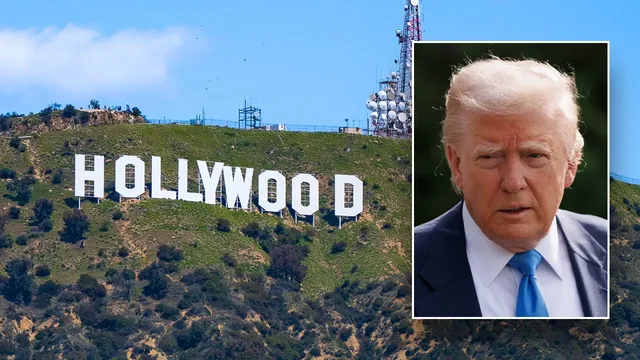
Trump imposes 100% tariffs on foreign films to protect U.S. industry
2025-05-08 00:00- President Donald Trump revealed plans to impose a 100% tariff on all films produced outside the U.S.
- He cited the fast decline of the American film industry due to foreign competition and tax incentives.
- The initiative is framed as a measure to revive domestic production and address national security concerns.
Express your sentiment!
Insights
In a recent declaration, U.S. President Donald Trump unveiled plans to implement a 100% tariff on all films produced outside the United States. This announcement is rooted in concerns regarding the decline of the American film industry, which Trump claims is experiencing a 'very fast death' due to foreign nations enticing filmmakers with incentives. Highlighting the competitive disadvantage faced by U.S. productions, Trump referred to the situation as a 'concerted effort' from other countries and emphasized its implications for national security. As such, he authorized relevant government agencies to take immediate actions to establish the tariff. The measure has been presented not only as a protectionist stance but also as a means of reviving domestic film production, which has reportedly decreased significantly in recent years. The film industry in America has faced increasing challenges from international competitors who have capitalized on financial incentives, diverting production away from traditional filmmaking hubs in the U.S. The announcement aligns with Trump's broader agenda of imposing tariffs on different sectors to bolster American manufacturers and create jobs. The decision to tax foreign films may also be understood within the context of Trump's ongoing trade wars, particularly with major economies such as China. Tariffs have already stirred considerable global economic tension, leading to fears of inflation and market volatility. Consequently, the proposed 100% tariff on foreign films could result in increased costs for consumers and potentially provoke retaliatory measures from other countries, threatening further strife in the already complex trade landscape. As discussions continue surrounding trade relations and domestic production, the prospect of these tariffs raises concerns about the implications for international collaboration in the film industry. Critics suggest that the retaliatory consequences may ultimately harm American filmmakers more than they would assist them. The situation demands careful monitoring to assess the real impact of such tariffs on the market and the industry's future trajectory as administration plans unfold.
Contexts
The history of U.S. tariffs on entertainment is a nuanced subject that intertwines economic policy, cultural influence, and international relations. From the early days of the nation, tariffs were implemented as a means to generate revenue and protect burgeoning domestic industries. In the context of entertainment, this primarily involved tariffs on goods such as imported films, music, and other forms of artistic expression. The Smith Act of 1940, which prohibited the employment of a few foreign actors in film production, illustrates the intertwining of cultural considerations with economic policy. The U.S. government sought to protect American culture and jobs by limiting foreign influence, which had direct implications for the film industry and the types of content that were promoted and available to American audiences. Throughout the 20th century, tariffs on entertainment evolved with changing political tides and global dynamics. The World Trade Organization, formed in 1995, aimed to reduce trade barriers, including tariffs on cultural products, leading to an increasingly interconnected global media landscape. The reduction of such tariffs benefitted American entertainment companies by allowing wider distribution of films and music internationally. However, it also created challenges for domestic content creators by increasing competition from foreign films and artists, compelling a re-evaluation of how local industries could thrive. The Clinton administration's 1993 North American Free Trade Agreement (NAFTA) further facilitated an open market that encouraged cross-border creative ventures, highlighting the need to balance free-market principles with the protection of local cultures. In recent years, the issue of tariffs on entertainment has re-emerged, especially amidst ongoing discussions related to trade agreements and intellectual property rights. The focus has shifted towards digital content and streaming services, as technological advancements have reshaped how entertainment is consumed and distributed. Tariffs on digital services remain a contentious topic in international negotiations, with countries debating how to tax large technology companies that dominate the market. American filmmakers and music producers have pushed for stronger intellectual property protections in trade agreements to curb piracy and ensure they are compensated fairly in the global market, reflecting a new paradigm in understanding the economic implications of entertainment. As of today, May 5, 2025, the discussion around tariffs in the entertainment industry continues to evolve. Policymakers must navigate the complexities of protecting domestic content while embracing the benefits of globalization and technological advancements. The historical context of these tariffs provides valuable insights into the intersection of culture and commerce, suggesting that future policy decisions will need to be informed by both past experiences and current trends. In this rapidly changing environment, an ongoing assessment of the role of tariffs in the entertainment sector will be crucial in ensuring that U.S. artists and producers can compete effectively in a global marketplace.